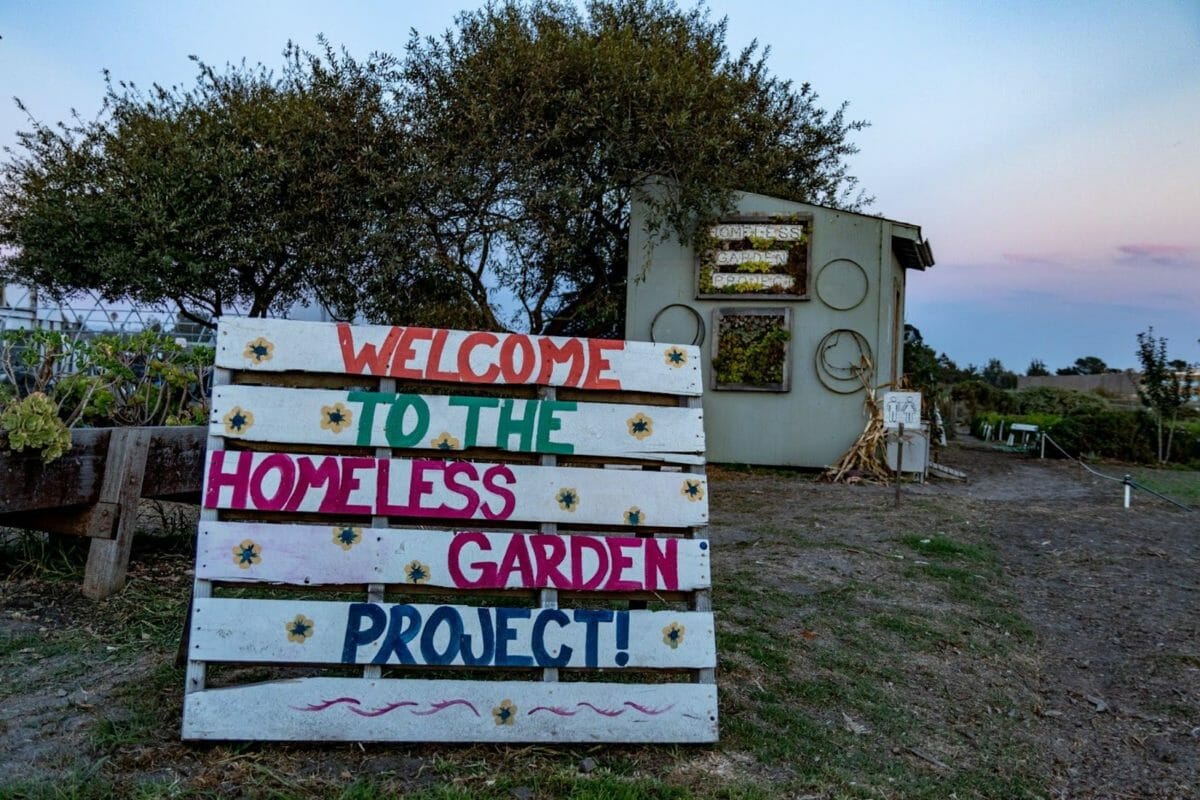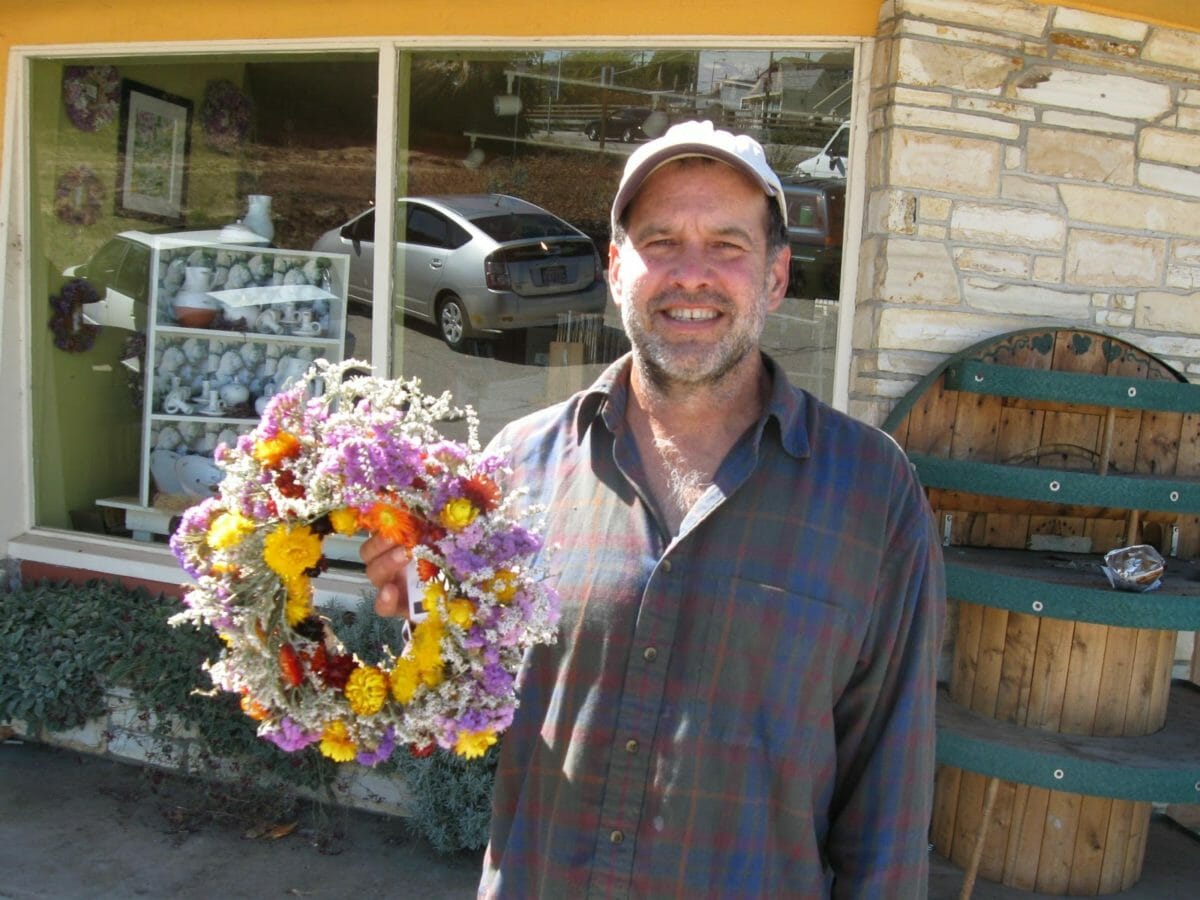This California Farm Helps The Homeless Get Off The Streets
At Homeless Garden Project, seeds are planted and lives are transformed.
This California Farm Helps The Homeless Get Off The Streets
At Homeless Garden Project, seeds are planted and lives are transformed.

Homeless Garden Project exists to provide new beginnings for displaced people.courtesy of Homeless Garden Project.
Michael Laffoon has a vivid memory of the day he decided to piece his life back together. “I literally woke up in my van and I thought ‘I can’t do this anymore because I’m going to die,’” he says. “It was just an overwhelming feeling that I had come to the end of a chapter.”
For eight years, the Santa Cruz, California resident grappled with a serious crystal meth addiction and drifted in and out of homelessness. It was a frustrating, impossible lifestyle. In 2007, Laffoon learned about Homeless Garden Project at a kitchen where he was volunteering. The not-for-profit aims to lift people living on the streets of Santa Cruz out of homelessness through farming. The end goal is that they will leave the farm with stable housing and a full-time job.
After a year and a half of being in the program, Laffoon was able to secure employment and stable housing. He later obtained a degree in horticulture.“It was the first step back into normal society—the first open door,” he says.
Eventually, he landed a job as a property manager for 48 residential properties in Santa Cruz. Out of those 48 units, 44 were converted into section-eight, low-income housing, which provided people who were previously homeless with a place to call home. He’s now semi-retired and picks up landscaping gigs in his spare time.

Paul Lee, a local philanthropist and former University of California Santa Cruz professor, founded Homeless Garden Project in 1990. He had spent a night in Santa Cruz’s first shelter and realized residents were deprived of an environment that allowed them to dream of a better future.
The project’s structure has evolved, but currently consists of a one-year enrolment period for participants. Trainees are employed to grow fruit, vegetables, flowers and herbs on the farm for 20 hours a week. They get paid a wage, are given basic job skills training and are matched with a social worker to work through specific goals.
Since its inception, Homeless Garden Project has helped close to 1,000 people. Over the past five years, 96 percent of graduates have obtained jobs or stable income and 86 percent have found housing. The farm is on 3.5 acres on the western outskirts of Santa Cruz.
The project’s staffers say that the project has always had a strong element of community, which is central to the healing process of its trainees, as they often feel like they’ve lost their sense of belonging. Laffoon says that while he was homeless, he spent a lot of his time “trying to be invisible” and felt secluded from the rest of society. The project gave him meaningful work and a sense of belonging, which helped him get back on his feet.
The Homeless Garden Project farm sells the produce it grows through a CSA and a farmstand to local residents and restaurants. Trainees also make a number of products such as wreaths, candles, jams, soaps, oils and creams, which are sold in their two retail stores as well as a few local businesses.
Ella Fleming, the project’s farm manager, has seen how growing food can have a life-changing and inspirational impact for trainees. There’s a parallel, she says, between the growing season of a plant and the growth of a trainee.
“Folks will come to us with so much trauma … we can provide a place where it’s safe, it’s nurturing, it’s healthy and there’s an exchange that happens,” she says. “When you’re caring for a plant to try to get it to thrive, you’re also giving yourself some self-care to know that you can thrive.”
Fleming adds that she knows that not all of their trainees will become farmers, but the skills they learn in the field provide a solid foundation. This rings true for Laffoon. And although he says he never thinks about where he would be without Homeless Garden Project, he feels a tremendous amount of gratitude for the role it has played in his life. He currently serves on the project’s board of directors to provide guidance.
In the future, the organization has plans to move the farm to the city’s Pogonip greenbelt area. With up to 9.5 acres of land, the expansion will allow the program to triple the number of people it serves.
Follow us
This work is licensed under a Creative Commons Attribution-NoDerivatives 4.0 International License.
Want to republish a Modern Farmer story?
We are happy for Modern Farmer stories to be shared, and encourage you to republish our articles for your audience. When doing so, we ask that you follow these guidelines:
Please credit us and our writers
For the author byline, please use “Author Name, Modern Farmer.” At the top of our stories, if on the web, please include this text and link: “This story was originally published by Modern Farmer.”
Please make sure to include a link back to either our home page or the article URL.
At the bottom of the story, please include the following text:
“Modern Farmer is a nonprofit initiative dedicated to raising awareness and catalyzing action at the intersection of food, agriculture, and society. Read more at <link>Modern Farmer</link>.”
Use our widget
We’d like to be able to track our stories, so we ask that if you republish our content, you do so using our widget (located on the left hand side of the article). The HTML code has a built-in tracker that tells us the data and domain where the story was published, as well as view counts.
Check the image requirements
It’s your responsibility to confirm you're licensed to republish images in our articles. Some images, such as those from commercial providers, don't allow their images to be republished without permission or payment. Copyright terms are generally listed in the image caption and attribution. You are welcome to omit our images or substitute with your own. Charts and interactive graphics follow the same rules.
Don’t change too much. Or, ask us first.
Articles must be republished in their entirety. It’s okay to change references to time (“today” to “yesterday”) or location (“Iowa City, IA” to “here”). But please keep everything else the same.
If you feel strongly that a more material edit needs to be made, get in touch with us at [email protected]. We’re happy to discuss it with the original author, but we must have prior approval for changes before publication.
Special cases
Extracts. You may run the first few lines or paragraphs of the article and then say: “Read the full article at Modern Farmer” with a link back to the original article.
Quotes. You may quote authors provided you include a link back to the article URL.
Translations. These require writer approval. To inquire about translation of a Modern Farmer article, contact us at [email protected]
Signed consent / copyright release forms. These are not required, provided you are following these guidelines.
Print. Articles can be republished in print under these same rules, with the exception that you do not need to include the links.
Tag us
When sharing the story on social media, please tag us using the following: - Twitter (@ModFarm) - Facebook (@ModernFarmerMedia) - Instagram (@modfarm)
Use our content respectfully
Modern Farmer is a nonprofit and as such we share our content for free and in good faith in order to reach new audiences. Respectfully,
No selling ads against our stories. It’s okay to put our stories on pages with ads.
Don’t republish our material wholesale, or automatically; you need to select stories to be republished individually.
You have no rights to sell, license, syndicate, or otherwise represent yourself as the authorized owner of our material to any third parties. This means that you cannot actively publish or submit our work for syndication to third party platforms or apps like Apple News or Google News. We understand that publishers cannot fully control when certain third parties automatically summarize or crawl content from publishers’ own sites.
Keep in touch
We want to hear from you if you love Modern Farmer content, have a collaboration idea, or anything else to share. As a nonprofit outlet, we work in service of our community and are always open to comments, feedback, and ideas. Contact us at [email protected].by Lindsay Campbell, Modern Farmer
March 2, 2020
Modern Farmer Weekly
Solutions Hub
Innovations, ideas and inspiration. Actionable solutions for a resilient food system.
ExploreExplore other topics
Share With Us
We want to hear from Modern Farmer readers who have thoughtful commentary, actionable solutions, or helpful ideas to share.
SubmitNecessary cookies are absolutely essential for the website to function properly. This category only includes cookies that ensures basic functionalities and security features of the website. These cookies do not store any personal information.
Any cookies that may not be particularly necessary for the website to function and are used specifically to collect user personal data via analytics, ads, other embedded contents are termed as non-necessary cookies.
I would like to know how to start a similar project in Chico
I’m interested to know WHERE your homeless enrollees live/sleep while they are working on the farm? Thanks for your reply.
A beautiful story, so very inspiring thanks for printing this. California has such a terrible homeless problem, which most news outlets are not willing to talk about, neither do the Politicians.
It’s hopeful that there are programs like this that want to help. I would love to read more content like this, thanks again 🙂
interested in promoting something similar in Annapolis, MD. Please post more info about the scheduling of plantings and types of training you give clients.
We need MANY more of these in CA, period. There’s a tremendous number of homeless, can see them most anywhere you go.
Great story, congrats!
Wonderful project! Just wondering if a name that didn’t focus on people’s present circumstances might be a little more inspiring. Rather than using ‘Homeless’ in the name perhaps a name like ‘New Horizons’ or ‘Fresh Starts’? Thanks for the all the positive you do for so many! Made my day:)
I loved this article. Thank you for helping people who are experiencing homelessness. I work for a mental health facility where we created an organic garden. The food that is harvested is donated to our food pantry. I have personally witnessed how being a part of the garden changes lives, it is almost magical.
I love this… can we replicate this in our areas !!!??? May in unison with city repair programs like MArk Lakeman is doing in Oregon <3
I am curious how transportation to and from the encampments and shelters people are living at during their time in the program is achieved.